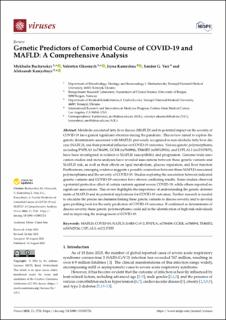| dc.description.abstract | Metabolic-associated fatty liver disease (MAFLD) and its potential impact on the severity of COVID-19 have gained significant attention during the pandemic. This review aimed to explore the genetic determinants associated with MAFLD, previously recognized as non-alcoholic fatty liver disease (NAFLD), and their potential influence on COVID-19 outcomes. Various genetic polymorphisms, including PNPLA3 (rs738409), GCKR (rs780094), TM6SF2 (rs58542926), and LYPLAL1 (rs12137855), have been investigated in relation to MAFLD susceptibility and progression. Genome-wide association studies and meta-analyses have revealed associations between these genetic variants and MAFLD risk, as well as their effects on lipid metabolism, glucose regulation, and liver function. Furthermore, emerging evidence suggests a possible connection between these MAFLD-associated polymorphisms and the severity of COVID-19. Studies exploring the association between indicated genetic variants and COVID-19 outcomes have shown conflicting results. Some studies observed a potential protective effect of certain variants against severe COVID-19, while others reported no significant associations. This review highlights the importance of understanding the genetic determinants of MAFLD and its potential implications for COVID-19 outcomes. Further research is needed to elucidate the precise mechanisms linking these genetic variants to disease severity and to develop gene profiling tools for the early prediction of COVID-19 outcomes. If confirmed as determinants of disease severity, these genetic polymorphisms could aid in the identification of high-risk individuals and in improving the management of COVID-19. | en_US |

